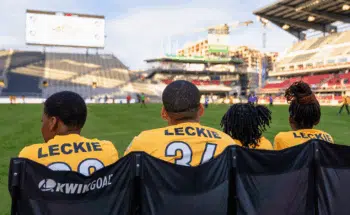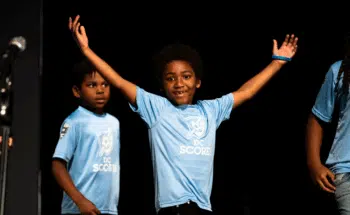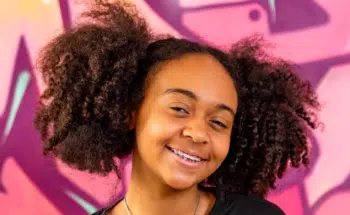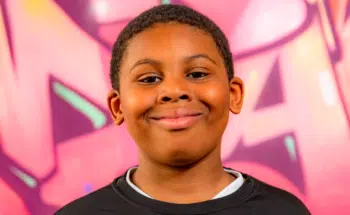“DC SCORES Keeps Us Safe!”: How Poet-Athletes at KIPP DC Quest Academy Took On Gun Violence Through Soccer, Poetry, and Service
Armed with research-backed strategies, poet-athletes then took to the streets. They held signs and distributed flyers during a peace walk around the neighborhoods where violence is most acute.
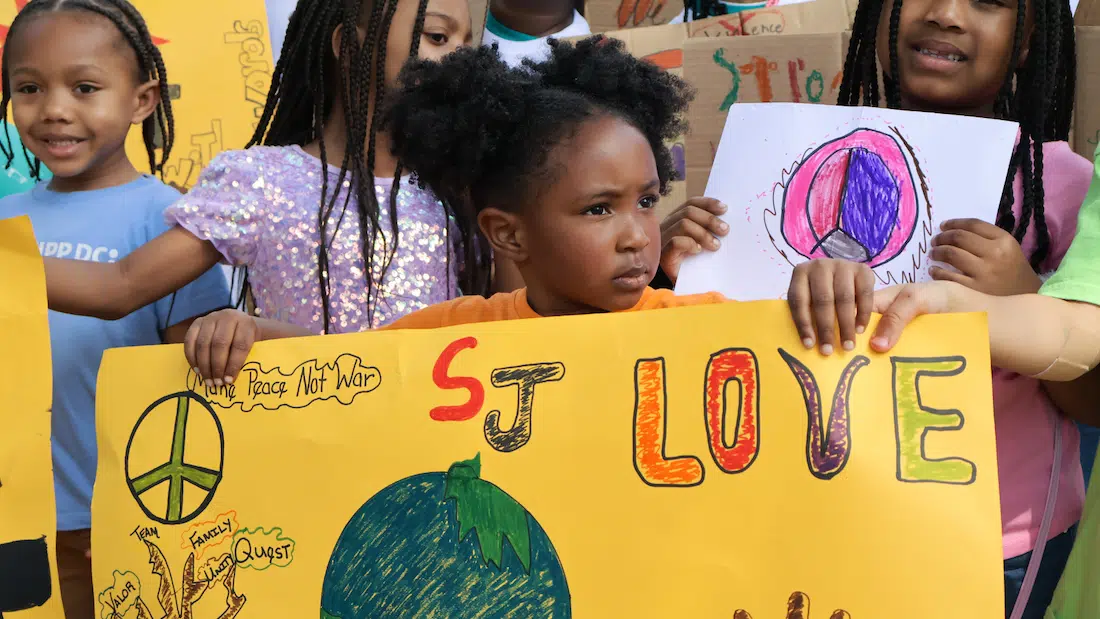
This story is part of the SCORES Community series, focusing on how members of the DC SCORES community are having an impact on D.C. through soccer, poetry, and service. Become part of our movement in Poet-Athlete City by supporting our programs today.
When coaches at KIPP DC Quest Academy polled their DC SCORES poet-athletes about what to tackle for their spring service-learning project, one issue came up again and again.
“They said, ‘Why are there a lot of shootings around the neighborhood?’” says Trinika McClain, a DC SCORES coach at the school.
The same question is on the minds of many D.C. residents. 2023 was the deadliest year for violence in the city since 1997. Last year, homicide rates rose by 30%, with the vast majority of those murders involving guns.
And though violent crime has been decreasing this year, many students at KIPP Quest have had little reprieve from incidents in the streets where they live. “Somebody just got shot, right in this neighborhood. The ambulance and the police came,” says Brandon, a second-grader on the team. “They shoot really often here.”
But Brandon and his DC SCORES teammates are determined not to let gun violence become a fact of life for them and their friends. All season, they have been working with their coaches to learn more about the causes of gun violence, how to avoid getting caught up in shootings, and long-term preventative strategies that can reduce violent crime across the community.
Their project culminated last Friday when poet-athletes took to the streets around their school for a peace walk that raised awareness of the impact of gun violence and demanded that adults find non-violent solutions to conflict.
“I wish grown-ups would talk about how they felt so they can fix it,” says Brandon’s sister, Selah, who is also a poet-athlete on the KIPP Quest team. “They could talk about it, be friends, and not have guns around.”
Bridging the Divide
“A lot of kids get shot for not doing anything because they think we’re part of that side,” says Brandon. He is referring to the decades-long beef between the neighboring Northeast communities of Clay Terrace and Lincoln Heights, which are located blocks from each other on opposite sides of Division Avenue.
Though KIPP Quest is located in the Clay Terrace neighborhood, many of its students live in Lincoln Heights. This fact means the school is well-positioned to bring healing to the community, but also that staff spend a lot of their time mediating between kids from the rival neighborhoods.
“You have kids saying, ‘I don’t like this neighborhood,’” says McClain. “We ask, ‘Why don’t you like this neighborhood? You’re a little kid, you don’t have no reason to not like them!’ We’re just trying to bring awareness to them.”
The longstanding animosity between the Clay Terrace and Lincoln Heights communities meant coaches were worried that the team’s message of peace may struggle to reach some poet-athletes. But McClain says the response has been overwhelmingly positive.
“What surprised me was that the students who were really in that environment, they really questioned it,” she says. “They wanted more knowledge about the why. Why is this happening?”
To find out, the team dug into crime statistics and research from expert organizations working on the ground to combat gun violence in U.S. cities. They also hosted a workshop from a staff member at Cure The Streets, a violence prevention program launched by the Office of the D.C. Attorney General that uses data-driven, public-health approaches to stop the spread of gun violence.
Poet-athletes also reached out to members of the KIPP Quest community who have been directly impacted by gun violence. For some kids on the team, these included their own relatives. “We really wanted them to be youth leaders, to talk to others about violence,” says McClain. “We hope it’s an eye-opener for the whole community.”
“DC SCORES Cares About Us”
Armed with research-backed strategies, poet-athletes then took to the streets. They held signs and distributed flyers during a peace walk around the neighborhoods where violence is most acute.
“We just wanted to stay stop, stop, stop the violence! Walk away from all the shooting,” says Brandon.
McClain says it was important for the team to be visible and vocal about how much they care for their neighbors, many of whom feel neglected by those in power. She hopes policymakers will take note and engage directly with local people to find long-term solutions to violence. “They should be out here every month, hosting peace rally walks, doing preventative activities to keep neighborhoods together,” she says.
In the meantime, both poet-athletes and coaches will continue in their own efforts to bring peace to their neighborhoods. Poet-athletes’ very participation in the DC SCORES afterschool program means they are less likely to become involved in violence while their soccer, poetry, and service-learning sessions are building powerful friendships that can overcome neighborhood rivalries.
“DC SCORES and the whole school is keeping us safe,” says Brandon, whose favorite aspect of the program is learning how to play soccer.
His sister, Selah, agrees. “The best thing about DC SCORES is that they care about us, and they make sure we are safe,” she says. “They give us opportunities for what we want to do when we grow up. They give us chances.”

